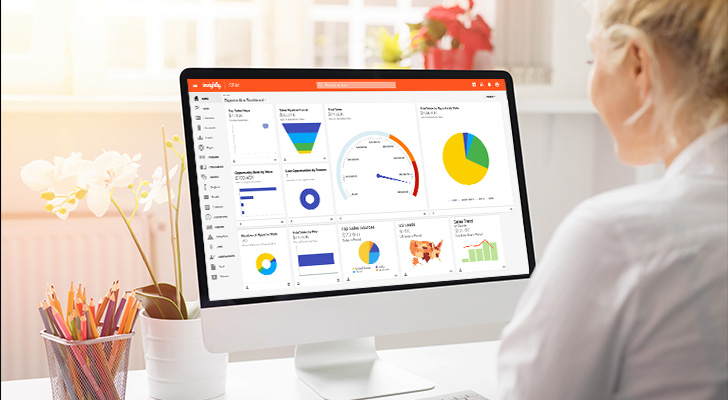In today’s digital world, customer data isn’t just important—it’s the backbone of every successful business. So whether you’re working with a handful of customers or tens of thousands, every company needs an effective way to store and manage customer data.
Most organizations start out with a simple spreadsheet (like Excel or Google Sheets) to record contact information, transaction histories, and basic communication records. But as your company grows, you’ll want to capture more complex information at a higher volume.
CRM templates can help to bridge the gap for companies that have outgrown basic spreadsheets but aren’t yet ready to invest in a full customer relationship management (CRM) solution. With the right CRM templates, you can replicate basic CRM functionality at a lower cost.
What is a CRM template?
A CRM template is a pre-configured file that’s designed to serve as a framework for organizing and managing customer data. CRM templates help streamline the process of managing customer data by providing a standardized layout for recording key pieces of information—like contact details, sales interactions, lead source, pipeline stage, purchase history, and more.
CRM templates can essentially turn an Excel or Google Sheets spreadsheet into a basic CRM tool, allowing you to:
- Organize and maintain customer contact information
- Manage leads and opportunities through the sales pipeline
- Prioritize tasks based on sales stages
- Track customer service interactions and support requests
There are countless pre-built CRM templates available for download, and many can be customized to better fit your sales process. There are even purpose-built CRM templates with “dashboards” for specialized needs like tracking sales pipeline, monitoring marketing performance, and assessing customer satisfaction.
Benefits of using CRM templates
For small-scale companies with relatively simple operations and a limited customer base, CRM templates provide a number of advantages, including:
- Affordability: Price is a major factor in any technology decision, and free CRM templates provide an affordable way to access basic CRM functionality.
- Ease of use: Most people have a basic understanding of spreadsheet software, so it’s simple to get a CRM template up and running.
- Customization: CRM templates typically offer the flexibility to modify standard fields, add custom fields, adjust formats, and change layouts to meet your business needs.
- Accessibility: Many CRM templates are built for cloud-based solutions, allowing for easy access anytime, anywhere.
5 limitations of CRM templates
While CRM templates may offer some benefits, they aren’t the right solution for every business. There are several important limitations to consider—especially as your company grows.
- They’re entirely manual: Manual data entry is time-consuming and prone to errors. Switching to a full CRM solution gives you access to automated workflows that help minimize tedious manual tasks.
- They’re difficult to scale: Spreadsheets aren’t designed to handle extensive databases, so large amounts of customer data may outpace their capabilities. It’s also challenging to share spreadsheets with a team and manage version control effectively.
- They don’t play well with others: Unlike dedicated CRM software, spreadsheets aren’t built to integrate with common business tools (like email, marketing automation, and doc gen solutions). So you’ll waste a lot of time switching between tools and exporting data.
- They aren’t secure: Spreadsheets don’t provide the same level of security as a dedicated CRM platform, so critical business data can easily be lost or stolen. They can also crash at any time or be deleted inadvertently.
- They lack reporting and analytics: Without the robust reporting features of a CRM solution, it’s almost impossible to monitor business results, analyze sales performance, and identify trends in customer engagement.
The best alternative to CRM templates
CRM templates may be useful for startups and small businesses, but spreadsheets simply can’t scale as your company grows. So you’ll inevitably run into problems like:
- Reduced productivity caused by manual data entry
- Lost, outdated, or incorrect customer data
- Challenges with collaboration and information sharing, leading to slow sales cycles
When it’s time for an upgrade, investing in a scalable, modern CRM platform like Insightly CRM is the best way to go beyond CRM templates. You’ll be able to solve the most common pain points of growing companies with these benefits:
- Flexibility: Easily customize the CRM to fit your unique business needs.
- Cross-team collaboration: Enable better decision-making across teams with a single, shared data set.
- Integration capabilities: Use AppConnect to build low-code integrations and connect with more than 500 common business tools.
- Affordable pricing: Get the right functionality for your business with affordable, per-user pricing that scales with you.
- Easy adoption: With an intuitive desktop app and a free companion mobile app, your team will be up and running in no time—without a pricey service engagement.
Ready to get started? Sign up for a free trial of Insightly CRM today, or request a personalized demo to see how our solution can help your company achieve its business goals.



